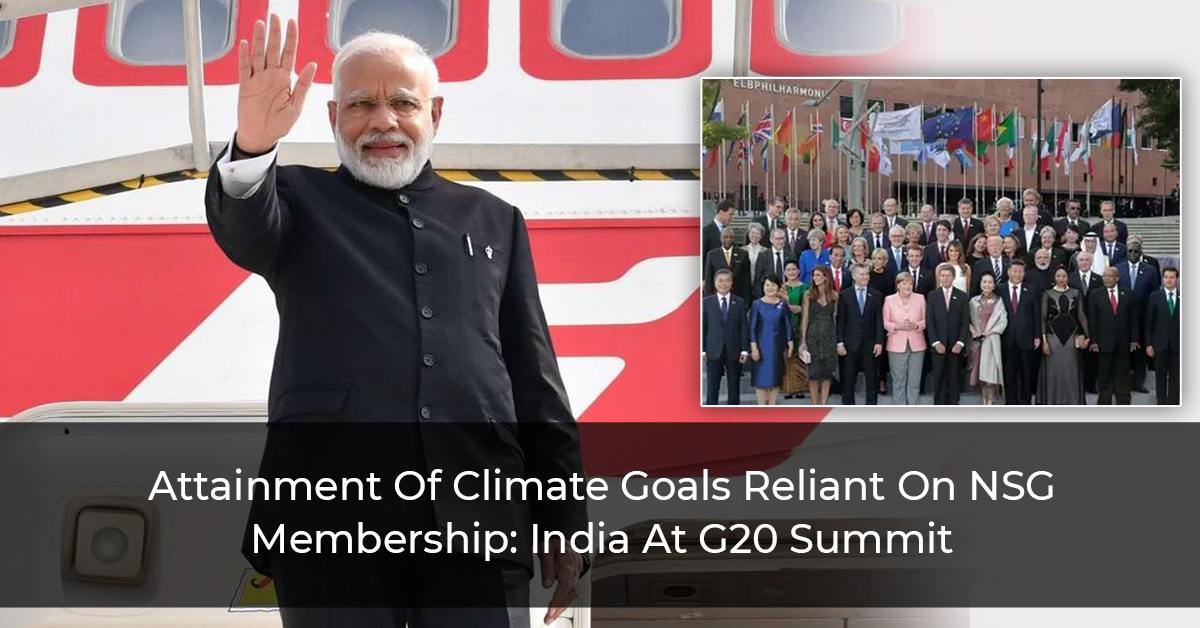Highlights:
- India’s membership in the Nuclear Supplier’s Group deemed necessary to bring about the replacement of coal with alternative sources of energy.
- 20 countries present at the summit accept the importance of recognizing Covid-19 vaccines deemed safe and effective by the WHO alongside enhancing its ability for the approval of vaccines.
At the G20 summit in Rome on Sunday, India laid down the plausible issues that exist in the face of pulling off the climate goals. It called attention to the vitality of membership to the Nuclear Supplier’s Group (NSG), in fulfilling the climate objectives. The NSG is a voluntary organisation of 48 countries that are authorised to export and transport civilian nuclear technology with adherence to mutually agreed on guidelines.
The ultimate objective of the NSG is to prevent nuclear proliferation by supervising the export of civilian nuclear material, equipment and technology that might be used for the manufacturing of nuclear weapons. India’s membership in the NSG is on hold at the moment on account of China’s opposition.
India firmly believes that it should get through with the NSG membership on the grounds of its sensible conduct as a nuclear state. The proposal for NSG membership cropped up as a part of India’s demand for the principle of “Common but Differentiated Responsibilities and Respective Capabilities (CBDR-RC)”, which was the cornerstone for climate action at the G20 meet in Rome, Italy.
On being questioned about the backing that India would need to facilitate the transition from coal to alternate technologies, the Minister of Commerce and Industry, as well as India’s Sherpa at the G20 meet, Piyush Goyal remarked that a decision can be taken based upon the availability of technologies for climate transition. For instance, the replacement of coal with nuclear would necessitate a huge amount of funds for setting up nuclear power plants to replace our present demands and ensure the fulfilment of future demands indispensable to developmental objectives.
Also Read, Facebook Changes Name To Meta, Follows Common Corporate Tactic
He emphasized the need to be a member of the Nuclear Supplier’s Group for sufficient availability of raw materials to cater to nuclear supply and numerous other correlated concerns around the cost of power.
At a news conference at the meet, India’s key speaker denoted there prevailed a realization among countries regarding the importance of shared standards for seamless travel – comprising testing requirements, certificates of vaccination and reciprocal recognition of digital applications, which was something that India persevering for.
India holds an assertive ground that pledges to tackle the pressure being intensified by the west on all nations supporting a net-zero target. Apart from this, the 20 countries responsible for almost 80% of global GDP have acknowledged that there needs to be recognition of Covid-19 vaccines believed to be safe and effectual by the World Health Organisation in addition to nourishing the global agency’s calibre for approval of vaccines incorporating optimising the procedures with the ultimate objective of broadening the tally of vaccines authorised for emergency use.
The aforementioned statement is pivotal as indigenous Covaxin is yet to receive emergency health approval from the WHO.
Goyal opinionated that for the first time the G20 summit has spotted the adoption of sustainable and responsible practices concerning consumption and production, coupled with providing finance and technology as ‘critical enablers’ for attaining climate objectives of keeping 1.5 degrees within reach. This, he added, was aligned to PM Narendra Modi’s vision of advocating sustainable lifestyles globally.


